Hao Ban
SAMO: A Lightweight Sharpness-Aware Approach for Multi-Task Optimization with Joint Global-Local Perturbation
Jul 10, 2025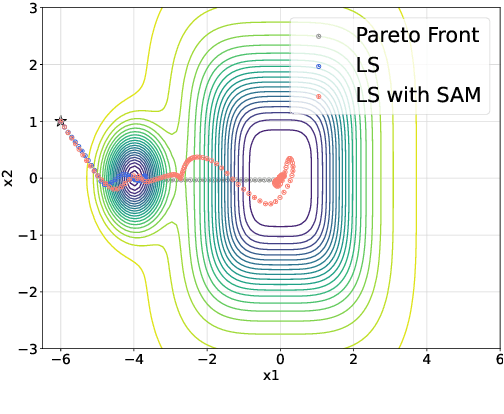

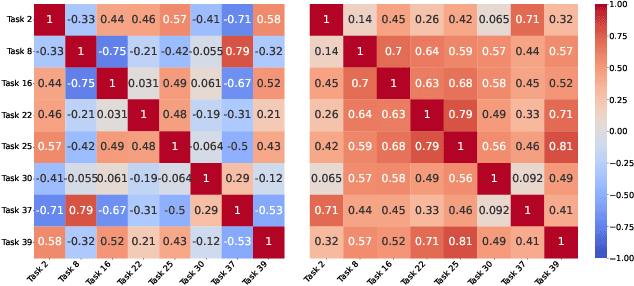
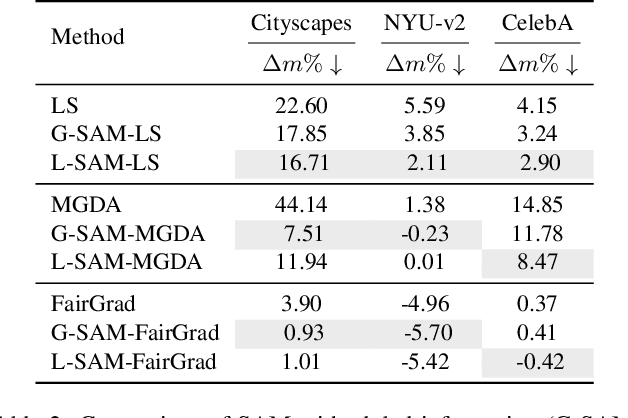
Abstract:Multi-task learning (MTL) enables a joint model to capture commonalities across multiple tasks, reducing computation costs and improving data efficiency. However, a major challenge in MTL optimization is task conflicts, where the task gradients differ in direction or magnitude, limiting model performance compared to single-task counterparts. Sharpness-aware minimization (SAM) minimizes task loss while simultaneously reducing the sharpness of the loss landscape. Our empirical observations show that SAM effectively mitigates task conflicts in MTL. Motivated by these findings, we explore integrating SAM into MTL but face two key challenges. While both the average loss gradient and individual task gradients-referred to as global and local information-contribute to SAM, how to combine them remains unclear. Moreover, directly computing each task gradient introduces significant computational and memory overheads. To address these challenges, we propose SAMO, a lightweight \textbf{S}harpness-\textbf{A}ware \textbf{M}ulti-task \textbf{O}ptimization approach, that leverages a joint global-local perturbation. The local perturbations are approximated using only forward passes and are layerwise normalized to improve efficiency. Extensive experiments on a suite of multi-task benchmarks demonstrate both the effectiveness and efficiency of our method. Code is available at https://github.com/OptMN-Lab/SAMO.
Tuning-Free Bilevel Optimization: New Algorithms and Convergence Analysis
Oct 07, 2024



Abstract:Bilevel optimization has recently attracted considerable attention due to its abundant applications in machine learning problems. However, existing methods rely on prior knowledge of problem parameters to determine stepsizes, resulting in significant effort in tuning stepsizes when these parameters are unknown. In this paper, we propose two novel tuning-free algorithms, D-TFBO and S-TFBO. D-TFBO employs a double-loop structure with stepsizes adaptively adjusted by the "inverse of cumulative gradient norms" strategy. S-TFBO features a simpler fully single-loop structure that updates three variables simultaneously with a theory-motivated joint design of adaptive stepsizes for all variables. We provide a comprehensive convergence analysis for both algorithms and show that D-TFBO and S-TFBO respectively require $O(\frac{1}{\epsilon})$ and $O(\frac{1}{\epsilon}\log^4(\frac{1}{\epsilon}))$ iterations to find an $\epsilon$-accurate stationary point, (nearly) matching their well-tuned counterparts using the information of problem parameters. Experiments on various problems show that our methods achieve performance comparable to existing well-tuned approaches, while being more robust to the selection of initial stepsizes. To the best of our knowledge, our methods are the first to completely eliminate the need for stepsize tuning, while achieving theoretical guarantees.
Finite-Time Analysis for Conflict-Avoidant Multi-Task Reinforcement Learning
May 25, 2024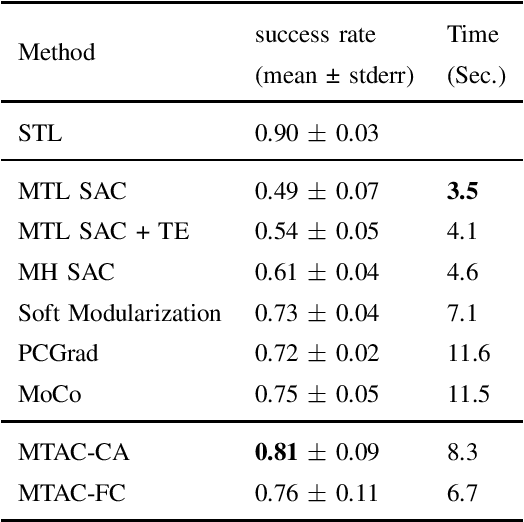

Abstract:Multi-task reinforcement learning (MTRL) has shown great promise in many real-world applications. Existing MTRL algorithms often aim to learn a policy that optimizes individual objective functions simultaneously with a given prior preference (or weights) on different tasks. However, these methods often suffer from the issue of \textit{gradient conflict} such that the tasks with larger gradients dominate the update direction, resulting in a performance degeneration on other tasks. In this paper, we develop a novel dynamic weighting multi-task actor-critic algorithm (MTAC) under two options of sub-procedures named as CA and FC in task weight updates. MTAC-CA aims to find a conflict-avoidant (CA) update direction that maximizes the minimum value improvement among tasks, and MTAC-FC targets at a much faster convergence rate. We provide a comprehensive finite-time convergence analysis for both algorithms. We show that MTAC-CA can find a $\epsilon+\epsilon_{\text{app}}$-accurate Pareto stationary policy using $\mathcal{O}({\epsilon^{-5}})$ samples, while ensuring a small $\epsilon+\sqrt{\epsilon_{\text{app}}}$-level CA distance (defined as the distance to the CA direction), where $\epsilon_{\text{app}}$ is the function approximation error. The analysis also shows that MTAC-FC improves the sample complexity to $\mathcal{O}(\epsilon^{-3})$, but with a constant-level CA distance. Our experiments on MT10 demonstrate the improved performance of our algorithms over existing MTRL methods with fixed preference.
Fair Resource Allocation in Multi-Task Learning
Feb 23, 2024Abstract:By jointly learning multiple tasks, multi-task learning (MTL) can leverage the shared knowledge across tasks, resulting in improved data efficiency and generalization performance. However, a major challenge in MTL lies in the presence of conflicting gradients, which can hinder the fair optimization of some tasks and subsequently impede MTL's ability to achieve better overall performance. Inspired by fair resource allocation in communication networks, we formulate the optimization of MTL as a utility maximization problem, where the loss decreases across tasks are maximized under different fairness measurements. To solve this problem, we propose FairGrad, a novel MTL optimization method. FairGrad not only enables flexible emphasis on certain tasks but also achieves a theoretical convergence guarantee. Extensive experiments demonstrate that our method can achieve state-of-the-art performance among gradient manipulation methods on a suite of multi-task benchmarks in supervised learning and reinforcement learning. Furthermore, we incorporate the idea of $\alpha$-fairness into loss functions of various MTL methods. Extensive empirical studies demonstrate that their performance can be significantly enhanced. Code is provided at \url{https://github.com/OptMN-Lab/fairgrad}.
Direction-oriented Multi-objective Learning: Simple and Provable Stochastic Algorithms
May 28, 2023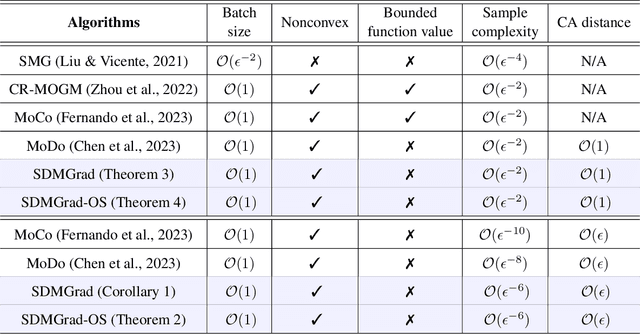
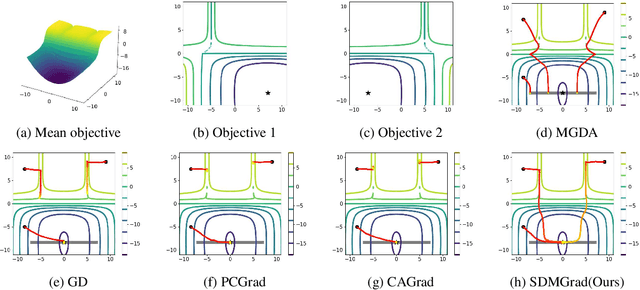
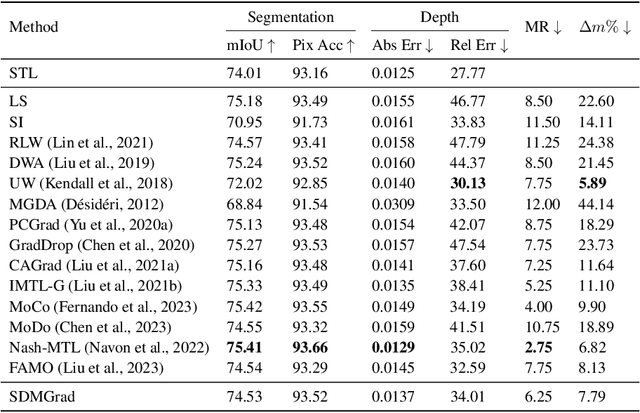
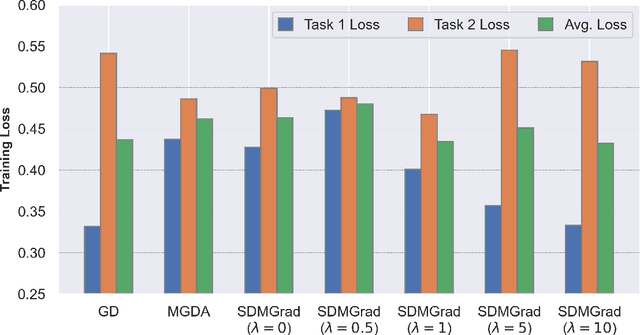
Abstract:Multi-objective optimization (MOO) has become an influential framework in many machine learning problems with multiple objectives such as learning with multiple criteria and multi-task learning (MTL). In this paper, we propose a new direction-oriented multi-objective problem by regularizing the common descent direction within a neighborhood of a direction that optimizes a linear combination of objectives such as the average loss in MTL. This formulation includes GD and MGDA as special cases, enjoys the direction-oriented benefit as in CAGrad, and facilitates the design of stochastic algorithms. To solve this problem, we propose Stochastic Direction-oriented Multi-objective Gradient descent (SDMGrad) with simple SGD type of updates, and its variant SDMGrad-OS with an efficient objective sampling in the setting where the number of objectives is large. For a constant-level regularization parameter $\lambda$, we show that SDMGrad and SDMGrad-OS provably converge to a Pareto stationary point with improved complexities and milder assumptions. For an increasing $\lambda$, this convergent point reduces to a stationary point of the linear combination of objectives. We demonstrate the superior performance of the proposed methods in a series of tasks on multi-task supervised learning and reinforcement learning. Code is provided at https://github.com/ml-opt-lab/sdmgrad.
Interleaving Learning, with Application to Neural Architecture Search
Mar 12, 2021
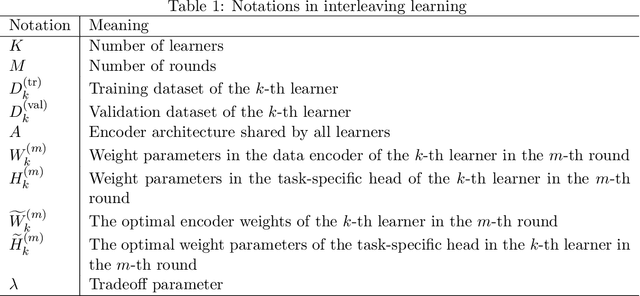
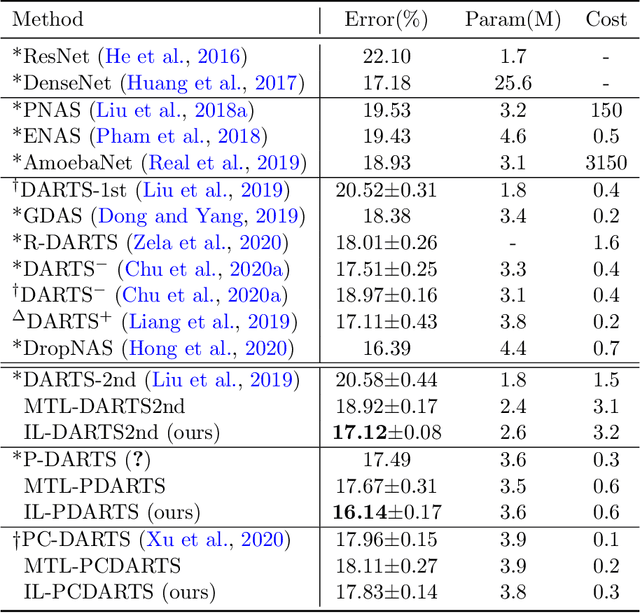

Abstract:Interleaving learning is a human learning technique where a learner interleaves the studies of multiple topics, which increases long-term retention and improves ability to transfer learned knowledge. Inspired by the interleaving learning technique of humans, in this paper we explore whether this learning methodology is beneficial for improving the performance of machine learning models as well. We propose a novel machine learning framework referred to as interleaving learning (IL). In our framework, a set of models collaboratively learn a data encoder in an interleaving fashion: the encoder is trained by model 1 for a while, then passed to model 2 for further training, then model 3, and so on; after trained by all models, the encoder returns back to model 1 and is trained again, then moving to model 2, 3, etc. This process repeats for multiple rounds. Our framework is based on multi-level optimization consisting of multiple inter-connected learning stages. An efficient gradient-based algorithm is developed to solve the multi-level optimization problem. We apply interleaving learning to search neural architectures for image classification on CIFAR-10, CIFAR-100, and ImageNet. The effectiveness of our method is strongly demonstrated by the experimental results.
Skillearn: Machine Learning Inspired by Humans' Learning Skills
Dec 09, 2020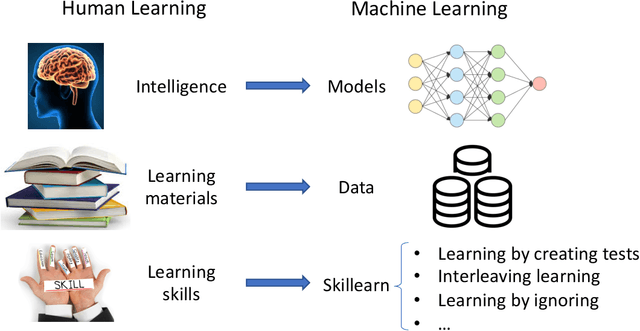
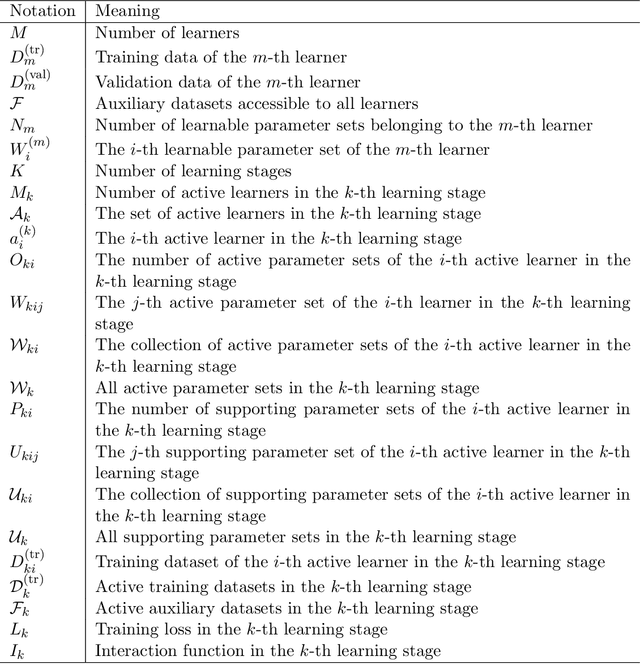
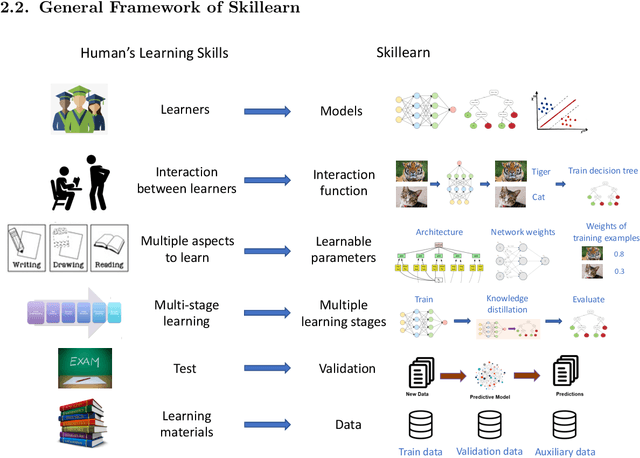
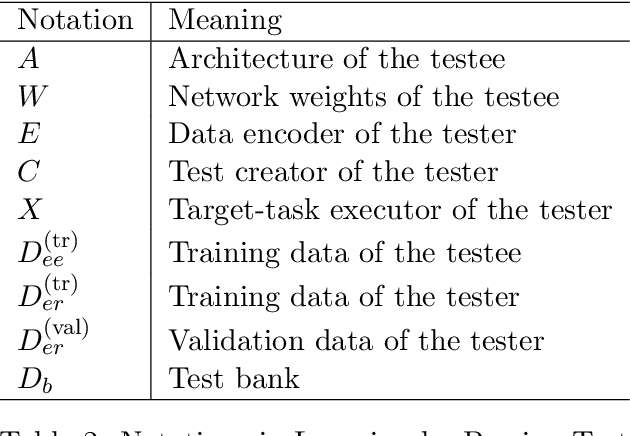
Abstract:Humans, as the most powerful learners on the planet, have accumulated a lot of learning skills, such as learning through tests, interleaving learning, self-explanation, active recalling, to name a few. These learning skills and methodologies enable humans to learn new topics more effectively and efficiently. We are interested in investigating whether humans' learning skills can be borrowed to help machines to learn better. Specifically, we aim to formalize these skills and leverage them to train better machine learning (ML) models. To achieve this goal, we develop a general framework -- Skillearn, which provides a principled way to represent humans' learning skills mathematically and use the formally-represented skills to improve the training of ML models. In two case studies, we apply Skillearn to formalize two learning skills of humans: learning by passing tests and interleaving learning, and use the formalized skills to improve neural architecture search. Experiments on various datasets show that trained using the skills formalized by Skillearn, ML models achieve significantly better performance.
 Add to Chrome
Add to Chrome Add to Firefox
Add to Firefox Add to Edge
Add to Edge